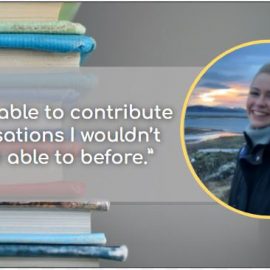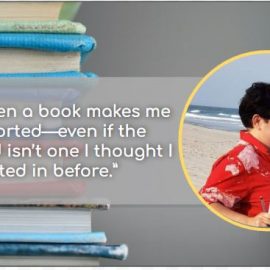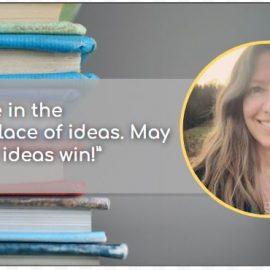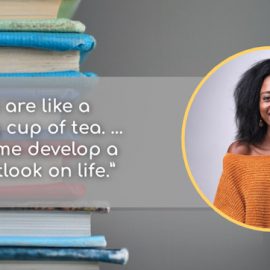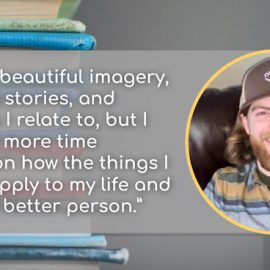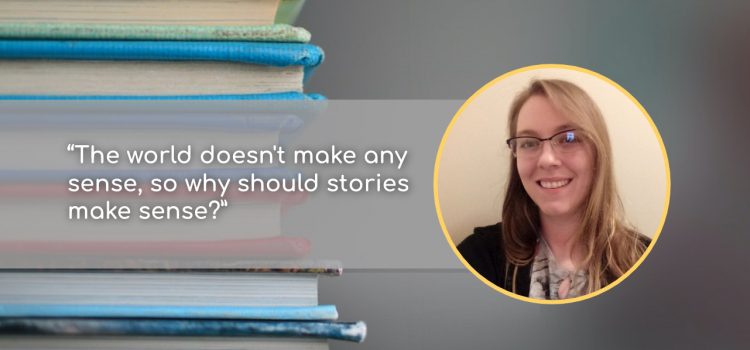
What’s the catch in Catch-22? What’s a dinkus? How do Shortform book guides generate a more well-rounded appeal than basic summaries do?
Hannah could tell you. Based in North Carolina, she’s a book guide writer at Shortform. We interviewed her recently to learn a bit about the books she reads in her free time.
Our Interview With Hannah
Hannah is a fan of the absurd, at least when it comes to literature. That draws her to certain authors and genres, but she’s certainly not stuck in a reading rut. Here’s what she had to say about her reading habits over the years.
What’s your favorite book and why?
My all-time favorite is Catch-22 by Joseph Heller because of its social and political commentary and the unique style it’s written in.
I also love Their Eyes Were Watching God by Zora Neale Hurston and Purple Hibiscus by Chimamanda Ngozi Adichie, which I think are two of the most beautifully written stories of all time. My favorite book of poetry is Kettle Bottom by Diane Gilliam Fisher because of the deeply personal perspective it gives on the labor struggles in a coal-mining town in 1920s West Virginia.
What are you reading these days?
The most recent book I read was Written on the Body by Jeannette Winterson. I’m currently reading Madeleine L’Engle’s A Wrinkle in Time series. After I finish that, I’m thinking about reading the Akira manga series since I love the movie so much.
If you could have a dinner party with any three authors—dead or alive—who would they be and why?
Franz Kafka—because I’d be desperately curious to get some insight into the inner workings of his mind. J. R. R. Tolkien—so we could talk about balrogs, soft magic systems, and the history of the English language. And, Chimamanda Ngozi Adichie—so we could talk about literature across cultures and how stories shape our perceptions of others.
What’s your favorite genre? Why does it intrigue you?
As a child, I loved fantasy because I was fascinated by magic and mythical creatures. But, in college, I fell in love with post-modern literature because its defiance of traditional forms and narrative structure were extremely appealing to my ADHD brain. The world doesn’t make any sense, so why should stories make sense? That’s an oversimplification, of course, but I’ve found that I love absurdity in almost any medium.
Are there any book genres or tropes that you dislike or refuse to read?
I’ve never been a big fan of the romance genre, but I can’t really explain why. I just never found it interesting. And, for some reason, it weirdly felt like an intrusion on the characters’ private lives. I especially dislike love triangles that pit women against each other for the attention of a man. But, I love when it’s subverted by having the two women in the triangle get together instead—looking at you, The Legend of Korra!
What’s your favorite way to read a book?
I like to have a physical copy of what I’m reading because I like the feel and smell of books and even just the tactile pleasure of flipping through the pages. I like to curl up very non-ergonomically in a chair with a cup of tea while I read. But, now that I’m in my 30s, my back is starting to object heavily to this habit.
What book do you think everyone should read in their lifetime?
I think everyone should read To Kill a Mockingbird by Harper Lee. It’s filled with timeless lessons. But, I think the most important of these is empathy, which the world needs a lot more of right now.
Who are your favorite authors?
I love Franz Kafka’s disorienting style and the baffling nature of many of his stories—and I think those are the same things I love about Joseph Heller. I also love Jack London’s beautiful depictions of the wilderness and his animal characters’ adventures. I love James Baldwin’s heart-wrenching stories and the uncompromising voice with which he tells them. And, I love Alice Walker’s stunning use of language and the raw emotional impact of the stories she tells.
How have your reading tastes changed over the years?
I shifted more from genre fiction like fantasy to literary fiction, but I still love most of the stories I loved as a kid. I also started to be drawn as much to an author’s style as to the story itself.
What’s an interesting fact that you learned from a book recently?
In Everybody Writes by Ann Handley, I learned that the name for a typographic symbol used as a page break is a “dinkus,” which sounds like a schoolyard insult or a very innocuous expletive.
Have any books you’ve read caused you to make any life changes or to develop any habits?
I think about a lot of the literature I read particularly in college—Things Fall Apart by Chinua Achebe, The Poisonwood Bible by Barbara Kingsolver, Their Eyes Were Watching God by Zora Neale Hurston, and The Color Purple by Alice Walker. They all made me more aware of racial issues and disparities and changed the way I approached these issues, and they introduced me to the idea of intersectionality.
What’s your favorite quote from a book or an author?
That’s almost impossible to narrow down! But, I certainly love the section in Catch-22 that explains the book’s title:
“There was only one catch, and that was Catch-22, which specified that a concern for one’s safety in the face of dangers that were real and immediate was the process of a rational mind. Orr was crazy and could be grounded. All he had to do was ask; and, as soon as he did, he would no longer be crazy and would have to fly more missions. Orr would be crazy to fly more missions and sane if he didn’t, but, if he was sane he had to fly them. If he flew them he was crazy and didn’t have to, but, if he didn’t want to he was sane and had to. Yossarian was moved very deeply by the absolute simplicity of this clause of Catch-22 and let out a respectful whistle.
“‘That’s some catch, that Catch-22,’ he observed.
“‘It’s the best there is,’ Doc Daneeka agreed.”
What are your favorite book adaptations and why?
I really enjoyed Peter Jackson’s Lord of the Rings trilogy. I know a lot of fans of the books didn’t care for the movies, but I thought they were visually stunning and perfectly cast, and Howard Shore’s score is one of my favorite soundtracks of all time.
Are there any lesser-known books that you’ve read that you want others to know exist?
The Queen of the Orcs trilogy by Morgan Howell. I love Tolkien, but, since becoming an adult, I’ve struggled with the depiction of a race of creatures that are inherently evil—orcs—and this trilogy subverted that trope in a really beautiful and compelling way.
At Shortform, how do you go about working on a book that has viewpoints you don’t agree with?
I remind myself that I’m not putting these ideas out there as ideas I’ve come up with—or even ideas that I endorse—but that I’m just relating what someone else has written. Then I use commentary to add ideas from other viewpoints to give it a more well-rounded appeal.
Hannah’s Recommended Reading List
- Catch-22 by Joseph Heller
- Their Eyes Were Watching God by Zora Neale Hurston
- Purple Hibiscus by Chimamanda Ngozi Adichie
- Kettle Bottom by Diane Gilliam Fisher
- To Kill a Mockingbird by Harper Lee
About the Series
At Shortform, we want to give our employees names and faces so you can get to know the people who make the magic happen. That’s why we’re doing the Shortform Reads series, where we interview our employees and share their thoughts and opinions. You can check out more employee interviews here.

